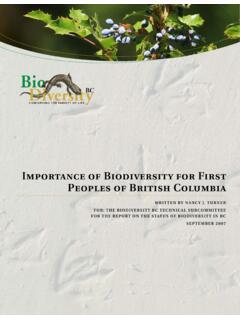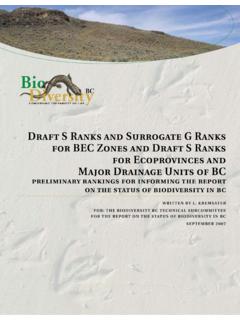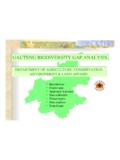Transcription of Major Impacts: Climate Change - biodiversitybc.org
1 Technical subcommitteecomponent reportMajor Impacts: Climate ChangePREPARED BY: COMPASS RESOURCE MANAGEMENTFOR: THE biodiversity BC TECHNICAL SUBCOMMITTEEFOR THE REPORT ON THE STATUS OF biodiversity IN BCMAY 2007 An Assessment of Climate Change Impacts on biodiversity Management in BC May 2007 Prepared By:Compass Resource Management Prepared For:The biodiversity BC Technical Sub Committee For the Report on the Status on biodiversity in BC Date: May 2007 Submitted to: Submitted by: biodiversity BC Technical Subcommittee Compass Resource Management Ltd.
2 For the Report on the Status of biodiversity in Major Impacts: Climate Change . Compass Resource Management, May 2007. i Acknowledgements Several reviewers provided useful comments and suggested edits during the preparation of this report. We thank Tory Stevens (Parks and Protected Areas Branch, BC Ministry of Environment), Dianna Colnett (Policy and Planning Department, Greater Vancouver Regional District), Jenny Fraser (Environmental Quality Branch, BC Ministry of Environment) and Richard Hebda (Royal British Columbia Museum) for their thoughtful support. Major Impacts: Climate Change . Compass Resource Management, May 2007.
3 IiTABLE OF CONTENTS 1. 1 2. Climate Change IMPACTS ON 1 1 FOCUS ON BRITISH 7 Past Climate Trends in British Columbia .. 7 Future Climate Scenarios for British 10 Climate Change Impacts on biodiversity in British Columbia .. 13 3. biodiversity MANAGEMENT UNDER A CHANGING Climate .. 23 23 24 4. DISCUSSION .. 30 5. DATA GAPS .. 32 6. CONCLUSION .. 33 7. 34 Major Impacts: Climate Change . Compass Resource Management, May 2007. 11. Introduction The Conservation Planning Tools Committee (CPTC), also known as the biodiversity Steering Committee, is currently in the process of developing British Columbia s biodiversity Action Plan.
4 An important milestone in the development of the action plan involves the preparation of an ecological assessment that will describe the current status, impacts and trends of biodiversity in British Columbia. Climate Change has been identified by the Committee as a Major impact area worthy of detailed assessment as part of this process. Accordingly, this report provides an overall summary and assessment of Climate Change impacts on biodiversity management in BC. This report has four primary sections: Section 2 begins by providing a broad overview of Climate Change impacts on biodiversity and introducing an analytical framework that structures the assessment.
5 Past Climate trends and future Climate projections for BC are then provided, followed by a compilation of current and predicted impacts. Section 3 reviews biodiversity management in BC in the context of Climate Change , highlighting actions that are currently underway as well as actions that have been recommended. Section 4 reflects on the results of the assessment, and discusses a range of management considerations that are specific to the context of biodiversity management under Climate Change . Section 5 outlines broad data gaps. This report was developed using an applied research methodology. As such, it both collates previous studies and information to date, and extrapolates toward the specific requirements of biodiversity s Technical Subcommittee s ecological assessment.
6 Specific tasks undertaken include: - Reviewing and summarizing Major reports and references provided by CPTC, Government contacts, and other professional colleagues, - Downloading Climate Change scenario results for BC, and synthesizing the broad trends as documented in recent government reports, - Synthesizing and categorizing Climate Change impacts on biodiversity in BC and biodiversity management actions that address these impacts, and - Identifying potential data gaps. Major Impacts: Climate Change . Compass Resource Management, May 2007. 12. Climate Change Impacts on biodiversity Overview There is growing consensus in the scientific community that Climate Change is occurring.
7 Research summarized in the Intergovernmental Panel on Climate Change (IPCC) Third Assessment Report indicates that global average surface temperatures are increasing, and that snow cover and ice extent are decreasing in the higher latitudes of the Northern Hemisphere (IPCC 2001a). While the absolute magnitude of predicted changes such as these are uncertain, there is a high degree of confidence in the direction of changes, and in the recognition that Climate Change effects will persist for many centuries. The United Nations Intergovernmental Panel on Climate Change (IPCC) has concluded that the global atmosphere is warming, noting that the average global surface temperature has increased by nearly 1 oC over the past century and is likely to rise by another to oC over the next century (IPCC, 2001a).
8 Such simple statements however mask the highly variable, site-specific and complex interactions among Climate Change effects. Atmospheric warming affects other aspects of the Climate system: the pressure and composition of the atmosphere; the temperature of surface air, land, water, and ice; the water content of air, clouds, snow and ice; wind and ocean currents; ocean temperature, density, and salinity; and physical processes such as precipitation and evaporation. One of the key complexities in any attempt to understand Climate Change in BC is to account for the natural variations and cycles that result from two Major sources.
9 The Pacific Decadal Oscillation is a natural cycling of warm and cool phases in the sea surface temperature over a 50-60 year cycle. The El Ni o Southern Oscillation is a shifting of tropical air pressure patterns along the west coast over a few-year cycle. These two cycles together, coupled with BC s complex topography and large size, make the task of predicting Climate and weather in BC very complex. Despite these Climate Change assessment challenges and Major uncertainties, certain conclusions are emerging. Of particular relevance to BC is the conclusion that Climate Change effects are expected to occur faster and be more pronounced than the global average over the mid and high latitudes of the Northern Hemisphere continents (IPCC, 2001a).
10 The potential for Climate Change to impact biodiversity has long been noted by the IPCC, other bodies (UNEP/IES, 1998), and by research biologists ( , Peters and Lovejoy, 1992). The recent leading book on the subject, Climate Change and biodiversity (Lovejoy and Hannah, 2005) provides a comprehensive scientific overview of both the past and potential future effects of Climate Change on biodiversity , and explores the associated conservation and management challenges. Figure 1 presents the overview analytical framework of Climate Change impacts on biodiversity that shape the structure of this report. In short, it involves making specific linkages along the continuum from Climate Change stressors to impact mechanisms and biodiversity management endpoints.










